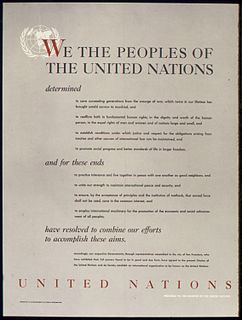See also
| This disambiguation page lists articles associated with the title Preamble to the Constitution. If an internal link led you here, you may wish to change the link to point directly to the intended article. |
Preamble to the Constitution may refer to:
| This disambiguation page lists articles associated with the title Preamble to the Constitution. If an internal link led you here, you may wish to change the link to point directly to the intended article. |

A preamble is an introductory and expressionary statement in a document that explains the document's purpose and underlying philosophy. When applied to the opening paragraphs of a statute, it may recite historical facts pertinent to the subject of the statute. It is distinct from the long title or enacting formula of a law.

The Constitution of India is the supreme law of India. The document lays down the framework demarcating fundamental political code, structure, procedures, powers, and duties of government institutions and sets out fundamental rights, directive principles, and the duties of citizens. It is the longest written constitution of any country on earth. B. R. Ambedkar, chairman of the drafting committee, is widely considered to be its chief architect.

The current Constitution of France was adopted on 4 October 1958. It is typically called the Constitution of the Fifth Republic, and replaced that of the Fourth Republic, dating from 1946. Charles de Gaulle was the main driving force in introducing the new constitution and inaugurating the Fifth Republic, while the text was drafted by Michel Debré. Since then, the constitution has been amended twenty-four times, through 2008.

The Preamble to the United States Constitution, beginning with the words We the People, is a brief introductory statement of the Constitution's fundamental purposes and guiding principles. Courts have referred to it as reliable evidence of the Founding Fathers' intentions regarding the Constitution's meaning and what they hoped the Constitution would achieve.
Arbën Xhaferi was an Albanian politician in Macedonia. He was born in Tetovo, Yugoslavia, and died in 2012 at the Skopje Hospital after a cerebral hemorrhage. Xhaferi was president of the Democratic Party of Albanians, an ethnic Albanian political party in the Republic of Macedonia, and was an advocate of rights for ethnic Albanians in the country. He is best known for calling for a change in the Preamble of the Constitution. He published two works focusing on the Albanian minority in Macedonia, "The DPA Non-Paper", and "The Challenges of Democracy in Multiethnic States," reiterating the beliefs of the PDPA.

The Parliament of Albania or Kuvendi is the unicameral representative body of the citizens of the Republic of Albania; it is Albania's legislature. The Parliament is composed of not less than 140 members elected to a four-year term on the basis of direct, universal, periodic and equal suffrage by secret ballot. The Parliament is presided over by a Speaker of the Parliament, who is assisted by at least one deputy speaker. The electoral system is based on party-list proportional representation. There are 12 multi-seat constituencies, corresponding to the country's administrative divisions.

The Constitution of the Republic of Korea is the supreme law of South Korea. It was promulgated on July 17, 1948, and was last revised on October 29, 1987.
The preamble to the Canadian Charter of Rights and Freedoms is the introductory sentence to the Constitution of Canada's Charter of Rights and Constitution Act, 1982. In full, it reads,
Whereas Canada is founded upon principles that recognize the supremacy of God and the rule of law

The current Constitution of Montenegro was ratified and adopted by the Constitutional Parliament of Montenegro on 19 October 2007 on an extraordinary session by achieving the required two-thirds supermajority of votes. The Constitution was officially proclaimed as the Constitution of Montenegro on 22 October 2007. This Constitution replaced the Constitution of 1992.

Eternal leaders of North Korea refers to the practice of granting posthumous titles to deceased leaders of North Korea. The phrase "Eternal Leaders of Juche Korea" was established by a line in the preamble to the Constitution, as amended on 30 June 2016, and in subsequent revisions.
A referendum on a proposed draft of the new Serbian constitution was held on October 28 and 29 October 2006 and resulted in the draft constitution being approved by the Serbian electorate. The constitution is Serbia's first as an independent state since the Kingdom of Serbia's 1903 constitution. Over 6.6 million people were entitled to vote in the national referendum.
It is the fundamental law of the Republic of Albania. The present Constitution of Albania was adopted by the Parliament on 28 November 1998. It is split up over many different acts. The document succeeded the 1976 Constitution, originally adopted at the creation of the People's Socialist Republic of Albania on 28 December 1976 and heavily amended on 29 April 1991.

The preamble to the Constitution of India is a brief introductory statement that sets out guidelines, which guides the people of the nation, and to present the principles of the Constitution, and to indicate the source from which the document derives its authority, and meaning The hopes and aspirations of the people are described in it. The preamble can be referred to as the preface which highlights the entire Constitution. It was adopted on 26 November 1949 by the Constituent Assembly and came into effect on 26 January 1950, celebrated as the Republic day in India.

The Republic of Ilirida is a proposed state declared twice by politician Nevzat Halili, once in 1992 and once in 2014. The idea has been declared unconstitutional by the Macedonian government. The secessionist concept of Ilirida emerged in the early 1990s and was advocated by some Albanian politicians as a solution to concerns and disputes the Albanian community had regarding constitutional recognition and minority rights within Macedonia.
Constitutional references to God exist in the constitutions of a number of nations, most often in the preamble. A reference to God in a legal text is called invocatio dei if the text itself is proclaimed in the name of the deity. A reference to God in another context is called nominatio dei. Such invocationes and nominationes dei are found notably in several European constitutional traditions and in the constitutions of Islamic countries.
The Preamble to the Albanian Constitution is a brief introductory statement of the Constitution's fundamental purposes and guiding principles. It states in general terms the will of the Albanian people to establish a new constitution based on universal values of freedom, respect for human rights, tolerance, coexistence and the determination to build a prosperous society that abides by the laws and regulations henceforth put in place.

The Preamble to the Constitution of the People's Socialist Republic of Albania is a brief introductory statement of the Constitution's fundamental purposes and guiding principles of the Socialist People's Republic of Albania.
A socialist state, socialist republic, or socialist country, sometimes referred to as a workers' state or workers' republic, is a sovereign state constitutionally dedicated to the establishment of socialism. The term "communist state" is often used interchangeably in the West specifically when referring to single-party socialist states governed by Marxist–Leninist, or Titoist in case of Yugoslavia political parties, despite these countries being officially socialist states in the process of building socialism. These countries never describe themselves as communist nor as having implemented a communist society. Additionally, a number of countries which are not single-party states based on Marxism–Leninism make reference to socialism in their constitutions; in most cases these are constitutional references alluding to the building of a socialist society that have little to no bearing on the structure and development paths of these countries' political and economic systems.
The Fundamental Statute of the Kingdom of Albania was the constitution used in the Albanian Kingdom. It was introduced by King Victor Emmanuel III of Italy after the Italian invasion of Albania. It replaced the previous constitution of the same name. It was signed by Victor Emmanuel III on 3 June 1939 and then presented to Shefqet Vërlaci in Rome, and went into effect the following day.